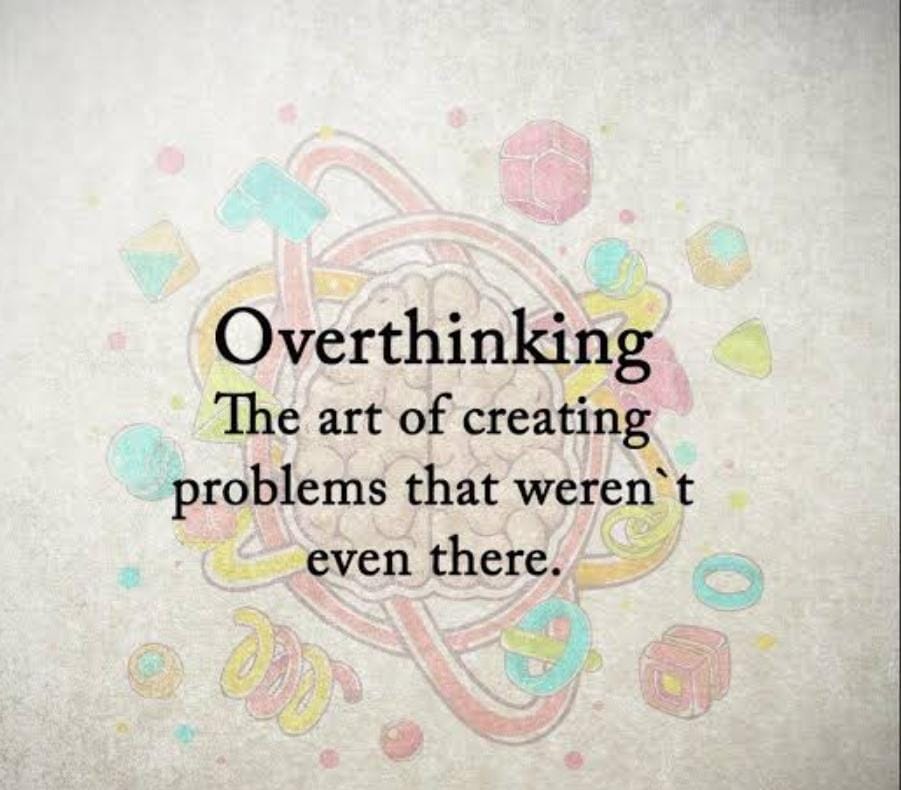27th Sept 2024
Most people I have met over the years are capable of building the life they want, but few execute on that capability.
I’ve come to believe that there is one common theme that holds people back from living the life they want—and the life they are capable of living: ‘Overthinking.’
And what’s more, I’ve experienced it in my own life. I used to overanalyze every decision, catastrophize the outcomes, and force myself into a state of mental paralysis.
I’d obsess over making the perfect decision, only to notice that the world wasn’t waiting for me to arrive upon it, and the moment and opportunity had passed.
I read everything I could find on how to stop overthinking, but noticed that most advice involved following some long, multi-step process—in other words, a bunch of thinking, to stop overthinking.
Today, I want to share what worked for me: 3 simple mindset shifts—reminders and reframes you can reliably turn to—that helped me conquer overthinking for good.
- The decision is less important than the actions that follow it.
90% of overthinking comes from a single flawed belief: That the decision is what matters.
The ultimate outcome in any given situation is governed far more by the actions that follow a decision than the decision itself.
In my own life, a lot of bad decisions were more accurately the result of inconsistent follow up actions.
I made a decision, but then failed to follow up with disciplined, focused daily effort to make it right.
A decision is rarely “bad” in a vacuum—but it’s always easier for us to blame the decision than to hold our desire and focus to the fire.
The decision is a one-time event—out of your control after making it—but the tens, hundreds, and thousands of actions that follow it are entirely within your control.
The highest performers & successful people I know, focus all of their energy on the actions that follow, not the decision itself.
They make a decision, then make it the right decision through their actions.
Stop placing so much emphasis on the decision itself and losing sight of your control over the actions that follow it.
Make a decision, then make it right through your actions.
- Trust in your adaptability, not your plan.
The lack of self-trust is the cause of a tremendous amount of overthinking. It is a lack of trust in your ability to make the right decision, to navigate to your desired destination.
Consider this simple metaphor:
“The explorer doesn’t set out on his voyage trusting that the seas will remain calm and that he will stay perfectly on course; but rather, in his ability to adapt when the inevitable storms and chaos arrive.”
You are the explorer and life is your voyage. You don’t need to place your trust in the perfect plan, but just in your ability to adapt.
Planning is fine, but beware the perils of over-planning.
As Mike Tyson famously said, “Everyone has a plan until they get punched in the mouth.”
Be the explorer: Make a plan, set sail, and trust in your ability to adapt when the inevitable punches of the sea start raining down on you.
- Most decisions are far more reversible than you think.
In his 1997 Amazon shareholder letter, Jeff Bezos shared an insight on the two different types of decisions an organization will face:
Some decisions are consequential and irreversible or nearly irreversible – one-way doors – and these decisions must be made methodically, carefully, slowly, with great deliberation and consultation. If you walk through and don’t like what you see on the other side, you can’t get back to where you were before. We can call these Type 1 decisions.
But most decisions aren’t like that – they are changeable, reversible – they’re two-way doors. If you’ve made a suboptimal Type 2 decision, you don’t have to live with the consequences for that long. You can reopen the door and go back through.
Type 2 decisions can and should be made quickly.
We have a tendency to use the heavy-weight Type 1 decision-making process on most decisions, including many Type 2 decisions.
The end result of this is slowness, unthoughtful risk aversion, failure to experiment sufficiently, and consequently diminished invention.
This offers a powerful lesson for life: Never mistake Type 2 decisions for Type 1.
For the overthinker, there is a common tendency to assume irreversibility—to assume that every decision is a Type 1 decision:
“If I quit my safe job to pursue this entrepreneurial path, I’ll never be able to go back.”
“If I move out and fail, I’ll never be able to move back home.”
“If this doesn’t work out, I’ll never be able to recover.”
“If this venture fails, no one will hire me.”
“If I say this, the relationship will break.”
The reality is Most decisions are far more reversible than you think.
That bold action creates a wealth of experience, skills, knowledge, and network that have value irrespective of whether the main thing works out or not.
You may not achieve the thing you set out to do, but you will leave far from empty-handed, which means you will have more to offer if you walk back through the door after a failure.
Walk through the door—it’s probably a two-way door anyway.
Stop overthinking for a better life & stay blessed forever.

